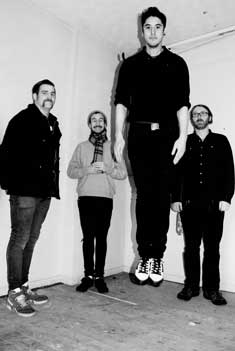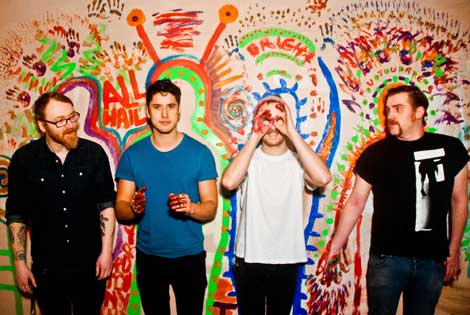AND SO I WATCH YOU FROM AFAR
UNREQUITED OBSESSION
Northern Ireland’s upstart gift to the post-rock era, And So I Watch You From Afar, has been making waves and garnering restraining orders since 2005. Formed in Belfast, the intrepid four-piece surprises and delights by interspersing their angular rock hooks with dissonant bursts of electronic fury.
With two albums and two EPs to their credit, ASIWYFA has earned a reputation for creating powerful, multi-dimensional, instrumental pieces augmented by the occasional glockenspiel or human voice. Burning the candle at both ends, dual guitarists Rory Friers and Niall Kennedy juxtapose melody and cacophony with incendiary results. Each pulse of noise, every break in the action, provides an abrupt but mutually-adopted jumping-off point for the band’s next musical (mis)adventure. With bassist Johnny Adger and drummer Chris Wee laying down a solid foundation, ASIWYFA’s towering sonic spires threaten to scrape the very heavens. It’s a good thing that these math-rock druids have their feet firmly planted on good old terra firma.
BeatRoute: How would you describe the current musical scene in Ireland at this time and where does ASIWYFA fall into the scheme of things?
Chris Wee: The Irish scene is still really healthy in terms of the quality of music coming out. Unfortunately, gigs are definitely feeling the effects of the recession with less numbers. We were fortunate to be coming up the ranks in Belfast at a time when there was a lot of collectivism and passion in the scene. ASIWYFA curated a mini-festival back in 2008 in Belfast, called “A Little Solidarity,” which showcased a huge variety of local talent and was a real high point for us career-wise, as well as a marker for how good our local scene was. There was a great sense of bands helping each other out and that is still very much alive in the present day. Back then, we were only beginning to do small bits of touring and were very active in Belfast. But, nowadays with our touring schedule we don’t get to spend much time in Belfast as we would like to. It’s nice to come back and get down to local shows when we’re home.
BR: How do you intertwine disparate elements like melody and brute force to make a cohesive whole? You often use explosive bursts of electronic distortion to punctuate and underscore your more straight-forward rock and roll creations. Are your juxtapositions intended as to come across complimentary rather than clashing, or both?

CW: From the outset, we have always strived to make interesting music, not just to entertain an audience but to challenge and entertain ourselves as well. We have also been keen never to cover old ground in terms of our writing and that has continually pushed us into new territory. Our writing process has evolved quite a lot since our first jamming way back in 2005/6. Rory [Friers, guitar] has always been the brains in regards to bringing the initial ideas of melodies, riffs and rough structures. Then, we get into the rehearsal room and thrash around until we start to get an idea of the song. That’s where the dynamics come in and ideas for ridiculous changes in pace or mood come from. We can be quite ruthless with material in that if we’re getting bogged down with an idea it’s better to cut it loose and move on to make sure the momentum and the creativity is maintained.
BR: In what ways is All Hail Bright Futures a reflection of the depth and complexity you’ve continued to build into your songwriting style since the release of your award-winning album, Gangs?
CW: All Hail Bright Futures was written with a lot less of the boundaries and restrictions we had with earlier work. With this album we decided that we would try and make the guitars sound as little like guitars as possible to keep the sound fresh and guitar lines were transposed onto other instruments to create a rich variety of sounds. We went into the studio with a very small percentage of the album written and it allowed us to be more open to different instruments and sounds, less precious over the older conventions of just guitars and drums. We approached it with really open minds and a willingness to try all sorts of different instrumentation. There was also a much more collective contribution from the three of us during the recording, the three of us were in all day every day constantly discussing and contributing ideas of how the song was progressing, which was an immensely satisfying experience.
By Christine Leonard
Originally published October 7, 2013 in BEATROUTE MAGAZINE
